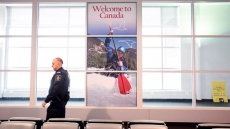OTTAWA — "What we would expect is the prime minister to do everything in his power to ensure that there's a free and fair negotiation. But instead what he's doing is bringing in the worst, most draconian legislation today, completely undemocratic, and what he's doing is trampling on the rights of working people." NDP Leader Jagmeet Singh. Nov. 23, 2018.
After five weeks of rotating strikes and a growing backlog of undelivered mail, Justin Trudeau's Liberal government last week introduced back-to-work legislation for the Canadian Union of Postal Workers. Bill C-89 was rushed through the House of Commons and the Senate and went into effect on Tuesday.
NDP Leader Jagmeet Singh called it "the worst, most draconian legislation."
Singh didn't specify whether he meant C-89 is the worst back-to-work legislation of all time, the worst ever applied to postal workers, or the worst seen recently.
Most likely, he was comparing C-89 to the Harper government's Bill C-6, which has been held by labour leaders to be one of the most flagrant violations of labour rights in Canada in recent memory.
That law, back-to-work legislation for Canada Post in 2011, was eventually ruled unconstitutional by the Ontario Superior Court in 2016. By stripping workers of their right to strike the way it did, the court ruled that the bill infringed on their constitutional rights to freedom of assembly and expression. Labour leaders now warn that the Liberals' bill will suffer the same fate as the Tories'.
But even assuming Singh is only comparing the Liberals' bill to the Conservative one, his assertion stretches the truth.
Spoiler alert: The Canadian Press Baloney Meter is a dispassionate examination of political statements culminating in a ranking of accuracy on a scale of "no baloney" to "full of baloney." (Complete methodology below.)
This one earns a ranking of "a lot of baloney." Here's why.
The Facts
The Harper government's back-to-work legislation for Canada Post was very different from the Trudeau government's.
The Conservative bill in 2011 imposed wage increases on postal workers that were actually below what Canada Post had already offered. It provided for an arbitrator to settle outstanding issues with "final-offer selection" — a winner-take-all process in which the union and Canada Post each present an offer and the arbitrator must pick one, with no ability to strike a compromise.
The government's choices of arbitrators were twice quashed by the Federal Court: the first over inexperience and the second, a Conservative party adherent who had previously represented Canada Post in a legal dispute with CUPW, for a reasonable apprehension of bias.
Ultimately, the two sides negotiated a new collective agreement without an arbitrator. But the union nevertheless challenged the constitutionality of Bill C-6. In 2016, the bill was ruled an unconstitutional infringement of postal workers' charter guarantees of freedom of expression and association.
Though the Liberals' law ordered an immediate end to rotating strikes this week, it does not impose a settlement between Canada Post and the two bargaining units involved.
It does extend the units' current collective agreements until new ones are done. It also provides for the appointment of a mediator-arbitrator — jointly agreed to by both parties or, failing that, appointed by the government on the advice of the Canada Industrial Relations Board — to try to resolve outstanding issues through mediation.
If mediation fails, the bill has the arbitrator impose a new agreement, guided by principles that include some of the key concerns raised by both the union and by Canada Post.
The Experts
Labour-law experts say C-89 may yet be found unconstitutional but the Trudeau government has tried to avoid the errors that resulted in that verdict against Bill C-6.
"It's not in the same legal ballpark as the 2011 law," says University of Toronto law professor Brian Langille.
"It's a very different law and does not make the same and what are — at least now (because of intervening Supreme Court judgments) — obvious legal mistakes. But this law poses a still very open and real legal question, a question the Supreme Court will have to answer."
That question, says Langille, is whether the government can force non-essential workers back to work "when they have no contractual obligation to do so and are simply not agreeing on new terms and conditions with their employer."
Eric Tucker, a labour-law professor at Osgoode Hall Law School, says: "Clearly, what happened here is the government read the Ontario judgment from 2016 that held Bill C-6 unconstitutional and tried to write (C-89) in a way that would avoid some of those pitfalls."
He notes that it doesn't impose a settlement, includes a process of consultation on the choice of arbitrator and compels the arbitrator to take into account the union's concerns about health and safety, pay equity and fair treatment of part-time employees, as well as Canada Post's concerns about things like financial sustainability.
"It's more of a balanced approach," Tucker says.
That said, Tucker stresses he's not endorsing C-89 and warns that it could still be found unconstitutional. That will come down to whether a court buys the government's argument that Section 1 of the Charter of Rights applies in this case — that is, that ordering an end to rotating strikes is a reasonable limit on postal workers' charter rights that can be "demonstrably justified in a free and democratic society."
The Verdict
If Singh actually meant C-89 is the worst back-to-work legislation of all time, Tucker observes diplomatically that politicians "often say things for dramatic effect and therefore, perhaps they exaggerate."
"To say that it's the most egregious violation (of labour rights) is probably not a sustainable position," he says, noting that in the distant past back-to-work legislation in Canada has included penalties for disobedience that put union leaders in jail — something not contemplated by either Bill C-6 or C-89.
Even assuming Singh meant only to compare C-89 to C-6, the experts say it's clear the Trudeau government has taken some pains to avoid the mistakes that resulted in the Harper government's legislation being found to be unconstitutional — although it could ultimately fall victim to the same fate.
For those reasons, there's "a lot of baloney" in claiming C-89 is the worst, most draconian back-to-work legislation.
Methodology
The Baloney Meter is a project of The Canadian Press that examines the level of accuracy in statements made by politicians. Each claim is researched and assigned a rating based on the following scale:
No baloney — the statement is completely accurate.
A little baloney — the statement is mostly accurate but more information is required.
Some baloney — the statement is partly accurate but important details are missing.
A lot of baloney — the statement is mostly inaccurate but contains elements of truth.
Full of baloney — the statement is completely inaccurate.




